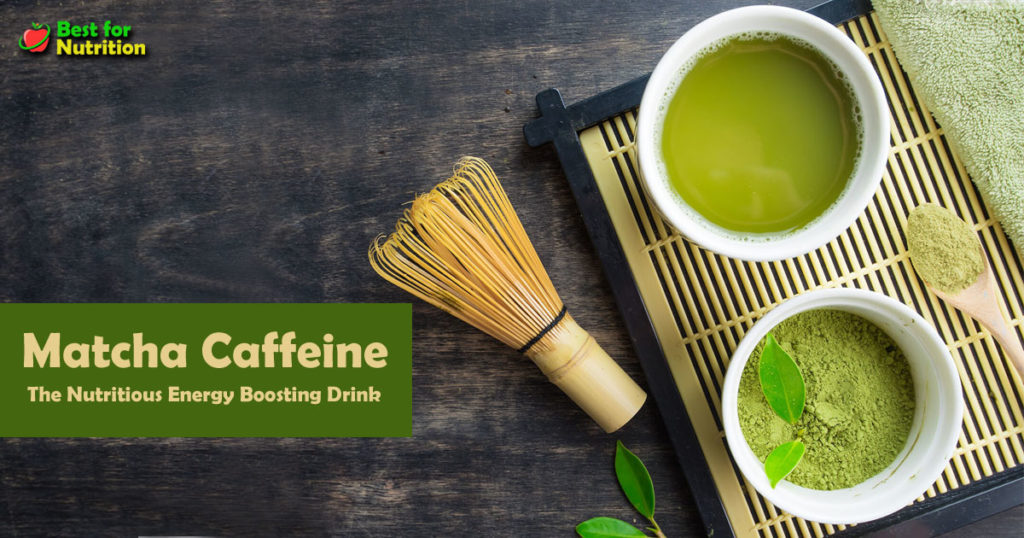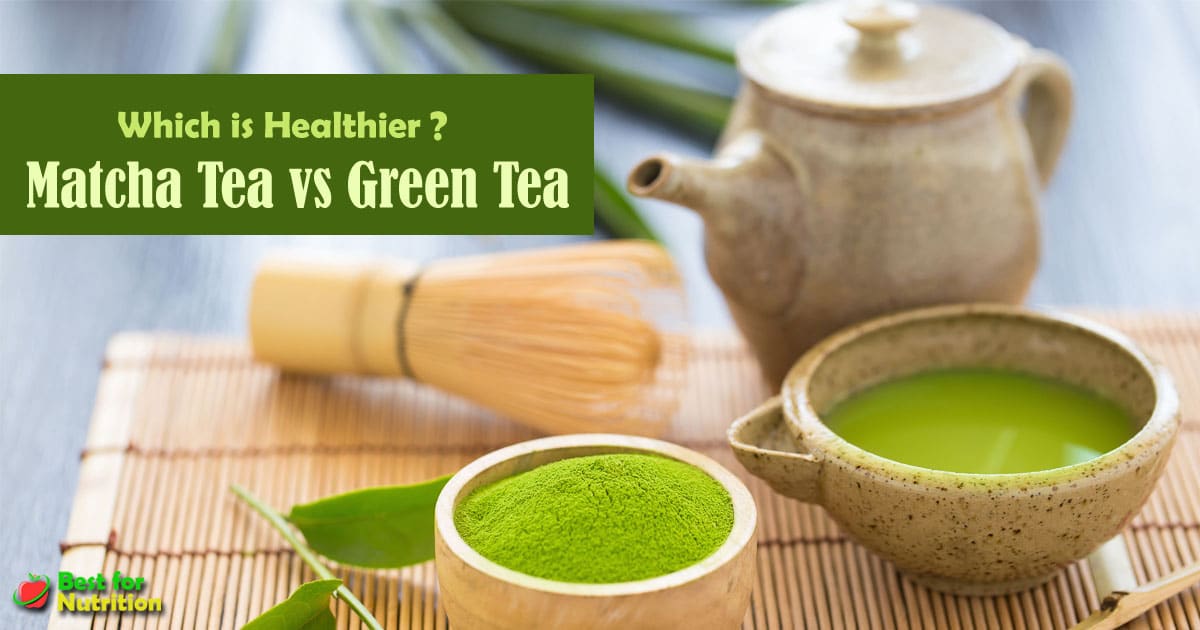Caffeine is a term we tend to connect with coffee rather than tea. But many types of tea have some amounts of caffeine in them. The Japanese Matcha tea has the highest caffeine content among all the teas.
Matcha, a type of green tea, is one of the most popular drinks of the Japanese. Starting from the cultivation of this tea, all the way to the creation of the packaged product and finally preparing the tea and drinking it, everything is unique about matcha.
Regular green tea and matcha provide similar health benefits but what distinguishes matcha from green tea is the higher nutritional content.

How Much Caffeine in Matcha Tea?
Caffeine is commonly found in many plant-based products including tea, coffee, fruits, and nuts. Caffeine is an important constituent in green tea and matcha holds more caffeine power than any other tea.
Matcha tea is obtained by grinding whole leaves into a fine powder. Since the entire leaf is consumed through matcha, caffeine consumption is also higher.
The caffeine content in matcha tea depends upon the grade of matcha. Approximately, 1 cup or 8 oz of matcha contains around 70 gm of caffeine. This is significantly higher than regular green tea which contains around 30 mg of caffeine. (1)
But still, matcha caffeine is lower than a cup of brewed coffee which is known to have around 95 mg of caffeine or higher. (2)
Summary: The concentrations of caffeine in matcha are higher than other tea varieties. Matcha tea contains more than double the caffeine found in green tea but its caffeine content is still lower than that of coffee.
Matcha Caffeine and L-Theanine
Matcha, a green tea, has high concentrations of both caffeine and the amino acid L-theanine. Among beverages, L-theanine is found only in tea and is available in higher concentrations in matcha than all other teas.
Matcha cultivation is unique and follows a shade-grown method during the final weeks before harvest. This method results in higher chlorophyll and phytochemical concentrations in matcha tea which accounts for peak concentrations of L-theanine and caffeine.
The caffeine in matcha is a stimulant and works to keep the energy levels high throughout the day. The adverse effects of high caffeine are negated through L-theanine. L-theanine acts as a relaxant and boosts alpha brain waves in the brain resulting in lowered anxiety and better focus. (3)
Consumption of matcha tea ensures that caffeine and L-theanine act in conjunction to maximize the cognitive functioning of the brain to perform tasks with mental alertness, stamina, and enthusiasm. (4)
Summary: Matcha has high concentrations of both caffeine and L-theanine that work in sync to deliver high amounts of energy, a relaxed mind, and a mental focus to enhance cognitive capabilities and performance.
Matcha Caffeine vs Coffee Caffeine
Caffeine provides health benefits such as increasing metabolism, boosting energy levels, improving cognitive functions, etc. but also has its downside which includes interaction with medicines and dependency. (5)
Matcha caffeine is slightly unique and more beneficial. It provides a sustained release of caffeine that provides increased energy and alertness without the post jitters of normal caffeine.
Between coffee and green tea matcha, the caffeine in matcha is released very slowly and over 6 to 8 hours. This slow-release paves way for extended energy but without the rush of adrenaline and the slump in energy levels that follow with regular caffeine in coffee.
Another big difference between coffee and matcha tea is the presence of L-theanine. While coffee has no trace of L-theanine, matcha tea has high amounts of L-theanine. This L-theanine content in matcha helps channelize the caffeine towards better focus and longer attention span.
Summary: The difference between coffee and matcha is that the caffeine in matcha is released in the body over time. The L-theanine in matcha helps harness the caffeine to avoid dips in energy and boost brain performance.
5 Benefits of Matcha Caffeine
Matcha is a type of green tea and its caffeine content may provide a host of benefits to one’s well being.
- Matcha consumption can increase the body’s energy and thermogenesis. The effective result is faster burning of calories and fat that can help people looking for weight loss. (6)
- The slow assimilation of matcha caffeine releases the effects of caffeine for a much longer time than normal tea or coffee.
- The caffeine and L-theanine combination in 42% Japanese matcha results in good energy levels with lowered stress that aid in reduced anxiety and better mental focus. (7)
- Since the caffeine content in matcha is higher than green tea, just 1 or 2 cups a day will suffice to provide your body with the necessary energy and stamina needed every day.
- Limiting matcha to a maximum of 2 cups and the lower caffeine content in comparison to coffee leaves no side-effects.
Summary: The caffeine in matcha is released very slowly and moderation in consumption can ensure many health benefits such as increased energy and fat-burning, reduced stress, and better mental performance.
Matcha and Caffeine Sensitivity
Matcha tea with all its goodness seems to be the ideal beverage among green tea varieties. The only possible downside with matcha is its high caffeine content. That’s why it is advisable to restrict matcha tea consumption to 1 or 2 two cups a day.
Although matcha caffeine does not cause spikes or crashes and works in concurrence with the relaxing effects of L-theanine, it may still not be an ideal choice for people who are sensitive to caffeine.
Individuals with chronic insomnia or disruptive sleep patterns should moderate intake of matcha and refrain from it before bedtime.
Owing to its high caffeine content, matcha is not recommended for pregnant, lactating women, and children. (8), (9)
Green tea may trigger stomach upsets or nausea in some people. Those with a history of peptic ulcers should exercise caution in drinking matcha as it is highly concentrated with green tea nutrients. (10)
Consumption of matcha green tea can worsen iron-deficiency anemia as it may lower iron absorption from dietary intake. (11)
Green tea caffeine can interfere with certain medicines and hence its best to check with your doctor before consuming matcha tea.
Summary: Caffeine sensitive people should moderate or refrain from matcha tea. The high caffeine content may not be suitable for pregnant, lactating women, children, and individuals who are under prescribed medication or certain medical conditions.
Frequently Asked Questions (FAQs)
What is the Caffeine Content in Matcha Tea?
Matcha is a type of green tea and all tea varieties contain caffeine. 1 cup of matcha tea contains about 70 gm of caffeine. It is twice the amount present in green tea which contains around 30 gm of caffeine.
What is the Ideal Time to Have Matcha Tea?
Matcha gives you the best results when taken early morning or early afternoon as it keeps you active and energized throughout the day.
If you are a habitual late-night worker, then nothing keeps you awake better than matcha. People who avoid coffee or tea late in the evening or night due to sleep issues should avoid matcha too.
If Matcha Contains Caffeine then How can it be a Relaxant?
Matcha does contain caffeine which acts as a stimulant. But matcha also contains L-theanine, an amino acid, that works to relax the brain. It is this unique combination of two powerful ingredients, that makes matcha better than your regular coffee or tea.
Can Matcha Help get Rid of Coffee addiction?
If you love coffee for its taste, then no. But if you have coffee to keep you active, then yes, Matcha is better than coffee in 2 aspects. One, the caffeine in matcha lasts for around 8 hrs, so you need only 1 or 2 matcha cups a day. Second, matcha also has L-theanine which helps negate the caffeine’s ill-effects. So you don’t end up getting the jitters or the slump you may otherwise experience from skipping your regular cups of coffee.
How Much Matcha is Too Much?
The maximum quantity of matcha one can have, depends entirely on the individual. But it is better to restrict matcha to just 2 cups a day for good benefits.
Is it Okay to Consume Matcha When you are Pregnant or Nursing?
Matcha is high in caffeine and is not advised for pregnant women especially during the first trimester. For more details, please check with your doctor before using matcha tea.
Is Matcha Tea Available as Loose Leaf Tea or as Tea Bags?
Matcha by its very definition is a powder that is mixed directly in hot water to make matcha tea. The unpowdered form of matcha is called “Tencha.” Gyokuro is another green tea available as loose leaf tea that can be considered as unpowdered matcha.
What Does Matcha Tea Taste Like?
Since Matcha tea is made from shade-covered leaves, it has a high chlorophyll content. This gives it a creamy, full-bodied taste. Depending on the grade of the tea, you may notice an astringent note to the flavor.
Some brands of matcha tea add other ingredients that influence the flavor of the final product. The ratio of powder to other ingredients used while making the tea, as well as, the temperature of the water used to make the tea, will influence the taste of your tea.
The Final Note
Matcha, a type of Japanese green tea is well known for its powdered texture and the unique flavor. It is also exceptional in terms of nutrition as it has the highest content of green tea constituents such as catechins, L-theanine, and caffeine.
The caffeine present in matcha tea is twice the amount in green tea, but still significantly lower than coffee.
Matcha caffeine is released slowly in the body and it works simultaneously with L-theanine to boost cognitive skills without the after-effects of regular caffeine. The result is more energy, less stress, and enhanced attention span.
With higher concentrations than green tea, matcha can increase the body’s thermogenesis and fat-burning capacity to aid weight loss.
Owing to the higher concentrations of caffeine, only a couple of matcha cups are recommended per day. Also, matcha is not advised for pregnant women, children, and people susceptible to caffeine intolerance.
Overall, the benefits of matcha caffeine outweigh the downside of caffeine consumption and can be taken safely in moderation to benefit one’s mental and physical health.
